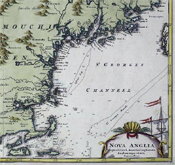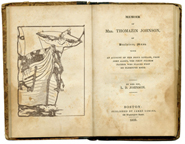|
|

|
from plymouth rock to antioch
by David Crowe, director of church growth, Home Missions Department |
FOR THOSE WHO HAVE READ MY HERITAGE HERALD ARTICLES, you know I have a great interest and a deep love for our Free Will Baptist heritage. In past articles I traced our Free Will Baptist history from the formation of the National Association in 1935 at Cofer’s Chapel Church in Nashville, Tennessee, to Benjamin Randall’s church in New Durham, New Hampshire, founded in 1780. I traced Paul Palmer and the southern roots of Free Will Baptists to 1727 in rural North Carolina, and I followed our heritage in America all the way back to Providence, Rhode Island, and the First Baptist Church in America, founded in 1638 by Roger Williams. For 133 years (until 1771), this church was considered a Six-Principle Baptist (old Freewill Baptist) Church.
In this article, allow me to trace our roots in America further still. A few months ago I came across an old book I wasn’t aware existed: Memoir of Mrs. Thomazin Johnson, written by her son, L.D. Johnson. Published in Boston by James Loring in 1835, this little book came from the Randall Freewill Baptist Sabbath School Library in Haverhill, Massachusetts.
L.D. Johnson was the Freewill Baptist minister who pastored the Roger Williams Church and brought it into the Freewill Baptist denomination in the early 1800s. Johnson wrote and published another book entitled, The Spirit of Roger Williams, detailing the history of Roger Williams, the first Baptist church in America, the eventual split in 1771, and the formation of the Roger Williams Church in Johnston, Rhode Island (Freewill Baptist group), pastored by Samuel Winsor.
In Memoir of Mrs. Thomazin Johnson, the author describes his mother’s pious lineage, beginning with John Alden, the first Pilgrim Father to set foot on Plymouth Rock. In his introduction Johnson states his purpose for writing the book. He says,

“To raise a monument to the memory of the just, and rescue from oblivion the fading accounts of departed virtue, to exhibit examples for the living, by bringing to view the characters of those who have run their race, and to open a channel through which a happy influence may roll on and bless generations yet unborn. These are the objects of this humble attempt.”
Mrs. Thomazin Gibson Johnson was born in Braintree, MA, September 20, 1765. Johnson traces his mother’s lineage on her paternal side, back to 1620 to John Alden. Alden emigrated from England to Holland, and subsequently to this country. The name John Alden first appears in the records of the Pilgrim Fathers with his signature on a contract forged upon the ship, Mayflower, while anchored in Cape Cod Harbor. This document formed and established a free, republican government. The signers pledged themselves to this civil compact. It was signed “the eleventh day of November, in the year of the reign of our sovereign lord, James, king of England, France and Ireland, the eighteen, and of Scotland the fifty-fourth, Ano Domini 1620.” This document established the principle of personal freedom, the foundation of all democratic institutions in America.
The Honorable Francis Baylis, in his memoirs of Plymouth Colony, attributes to John Alden, the honor of first placing foot on Plymouth Rock. While some dispute this record, attributing the honor to Mary Chilton, the evidence of history seems to favor John Alden. Alden’s lineage also contains two United States Presidents, John Adams and John Quincy Adams, quite a remarkable heritage.
Let me be clear. My purpose is not to claim that the Pilgrim Fathers were Free Will Baptists, but rather to show that Free Will Baptists and their ancestors have influenced every aspect of American history. Today, the National Association of Free Will Baptists extends from Antioch, Tennessee, to churches and missions around the globe.
From Plymouth Rock to Antioch! May we continue to build our heritage and to be a tremendous influence, both in America and around the world!
David Crowe, director of church growth for Home Missions, travels the nation preaching and speaking at retreats and camps. David loves FWB history and has done extensive research into the early development of Free Will Baptists. Contact David at david@nafwb.org.
encouragement from unexpected places
I recently returned from a few days away from my office to find four little postcards nestled in the pile of work awaiting my attention. The cards grabbed my attention right away and piqued my curiosity. I wondered who could have sent them.
As I sat and read through them, I realized I had received cards of encouragement from a group of young people in the Waipahu Free Will Baptist Church in Hawaii. You can’t imagine how special it made me feel to know these young people were praying for me and had taken the time to let me know I was on their mind.
As the next few days passed, one by one, I saw the faces of my co-workers light up as they too received postcards. I heard comments such as, “Oh, look at what I just received!” and “This is so nice!” all around the national office building. I also began to see comments about the notes in various state papers from across the denomination! These children had really been busy about the Lord’s work.
Not only would I like to take this opportunity to thank Krystle, Mane, Lisa, and Victor, my personal encouragers; I want to add a special thank-you to the many who have taken their time to send notes of encouragement to others. Cards and letters from Free Will Baptists of all ages have brightened the day of many a Christian worker—and always at just the right time. Please know that the prayers, notes, telephone calls, and visits are deeply appreciated. God always knows just what we need and when we need it. Thanks for heeding His call.
Ida C. Lewis is the publications editor
for the Home Missions Department in Antioch, TN. Email Ida: ida@nafwb.org.
|
|

